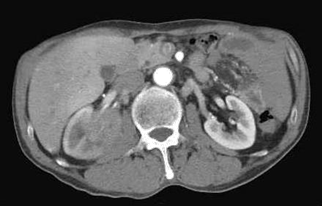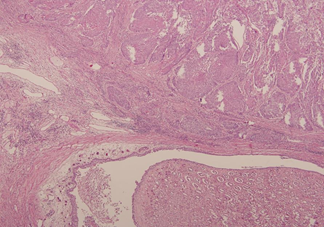Renal Metastasis of Esophageal Squamous Cell Carcinoma- A Case Report and Literature Review
Yu-Sheng Lin1, Kun-Yuan Chiu1*, Siu-Wan Hung2 and Hsin-Ni Li3
1Division of Urology, Department of Surgery, Taichung Veterans General Hospital, Taichung, Taiwan
2Department of Radiology, Taichung Veterans General Hospital, Taichung, Taiwan
3Department of Pathology, Taichung Veterans General Hospital, Taichung, Taiwan
*Corresponding Authors: Dr. Kun-Yuan Chiu, Division of Urology, Department of Surgery, Taichung Veterans General Hospital, Taichung, Taiwan, Tel: +886-4-23741215; Fax: 886-4-23595046;
Received: 04 January 2018; Accepted: 23 January 2018; Published: 31 January 2018
Article Information
View / Download Pdf Share at FacebookAbstract
Esophageal cancer rarely metastasizes to the kidney. The metastatic organs known more commonly are the liver, lung, and bone. Here, we report a case of a 58 year-old male, who had been diagnosed with squamous cell carcinoma of the esophagus 22 months ago, developed renal metastasis. He subsequently received nephrectomy and adjuvant chemotherapy. We also reviewed similar cases in the literature. This case report could alert physicians caring patients of esophageal carcinoma to pay more attention to the less common renal metastasis.
Keywords
Kidney, Metastasis, Esophageal Cancer, Squamous cell carcinoma
Kidney articles Kidney Research articles Kidney review articles Kidney PubMed articles Kidney PubMed Central articles Kidney 2023 articles Kidney 2024 articles Kidney Scopus articles Kidney impact factor journals Kidney Scopus journals Kidney PubMed journals Kidney medical journals Kidney free journals Kidney best journals Kidney top journals Kidney free medical journals Kidney famous journals Kidney Google Scholar indexed journals Metastasis articles Metastasis Research articles Metastasis review articles Metastasis PubMed articles Metastasis PubMed Central articles Metastasis 2023 articles Metastasis 2024 articles Metastasis Scopus articles Metastasis impact factor journals Metastasis Scopus journals Metastasis PubMed journals Metastasis medical journals Metastasis free journals Metastasis best journals Metastasis top journals Metastasis free medical journals Metastasis famous journals Metastasis Google Scholar indexed journals Esophageal Cancer articles Esophageal Cancer Research articles Esophageal Cancer review articles Esophageal Cancer PubMed articles Esophageal Cancer PubMed Central articles Esophageal Cancer 2023 articles Esophageal Cancer 2024 articles Esophageal Cancer Scopus articles Esophageal Cancer impact factor journals Esophageal Cancer Scopus journals Esophageal Cancer PubMed journals Esophageal Cancer medical journals Esophageal Cancer free journals Esophageal Cancer best journals Esophageal Cancer top journals Esophageal Cancer free medical journals Esophageal Cancer famous journals Esophageal Cancer Google Scholar indexed journals Squamous cell carcinoma articles Squamous cell carcinoma Research articles Squamous cell carcinoma review articles Squamous cell carcinoma PubMed articles Squamous cell carcinoma PubMed Central articles Squamous cell carcinoma 2023 articles Squamous cell carcinoma 2024 articles Squamous cell carcinoma Scopus articles Squamous cell carcinoma impact factor journals Squamous cell carcinoma Scopus journals Squamous cell carcinoma PubMed journals Squamous cell carcinoma medical journals Squamous cell carcinoma free journals Squamous cell carcinoma best journals Squamous cell carcinoma top journals Squamous cell carcinoma free medical journals Squamous cell carcinoma famous journals Squamous cell carcinoma Google Scholar indexed journals Esophageal Cancer articles Esophageal Cancer Research articles Esophageal Cancer review articles Esophageal Cancer PubMed articles Esophageal Cancer PubMed Central articles Esophageal Cancer 2023 articles Esophageal Cancer 2024 articles Esophageal Cancer Scopus articles Esophageal Cancer impact factor journals Esophageal Cancer Scopus journals Esophageal Cancer PubMed journals Esophageal Cancer medical journals Esophageal Cancer free journals Esophageal Cancer best journals Esophageal Cancer top journals Esophageal Cancer free medical journals Esophageal Cancer famous journals Esophageal Cancer Google Scholar indexed journals cancer articles cancer Research articles cancer review articles cancer PubMed articles cancer PubMed Central articles cancer 2023 articles cancer 2024 articles cancer Scopus articles cancer impact factor journals cancer Scopus journals cancer PubMed journals cancer medical journals cancer free journals cancer best journals cancer top journals cancer free medical journals cancer famous journals cancer Google Scholar indexed journals chemotherapy articles chemotherapy Research articles chemotherapy review articles chemotherapy PubMed articles chemotherapy PubMed Central articles chemotherapy 2023 articles chemotherapy 2024 articles chemotherapy Scopus articles chemotherapy impact factor journals chemotherapy Scopus journals chemotherapy PubMed journals chemotherapy medical journals chemotherapy free journals chemotherapy best journals chemotherapy top journals chemotherapy free medical journals chemotherapy famous journals chemotherapy Google Scholar indexed journals patients articles patients Research articles patients review articles patients PubMed articles patients PubMed Central articles patients 2023 articles patients 2024 articles patients Scopus articles patients impact factor journals patients Scopus journals patients PubMed journals patients medical journals patients free journals patients best journals patients top journals patients free medical journals patients famous journals patients Google Scholar indexed journals Panendoscopic articles Panendoscopic Research articles Panendoscopic review articles Panendoscopic PubMed articles Panendoscopic PubMed Central articles Panendoscopic 2023 articles Panendoscopic 2024 articles Panendoscopic Scopus articles Panendoscopic impact factor journals Panendoscopic Scopus journals Panendoscopic PubMed journals Panendoscopic medical journals Panendoscopic free journals Panendoscopic best journals Panendoscopic top journals Panendoscopic free medical journals Panendoscopic famous journals Panendoscopic Google Scholar indexed journals Ureteroscopic biopsy articles Ureteroscopic biopsy Research articles Ureteroscopic biopsy review articles Ureteroscopic biopsy PubMed articles Ureteroscopic biopsy PubMed Central articles Ureteroscopic biopsy 2023 articles Ureteroscopic biopsy 2024 articles Ureteroscopic biopsy Scopus articles Ureteroscopic biopsy impact factor journals Ureteroscopic biopsy Scopus journals Ureteroscopic biopsy PubMed journals Ureteroscopic biopsy medical journals Ureteroscopic biopsy free journals Ureteroscopic biopsy best journals Ureteroscopic biopsy top journals Ureteroscopic biopsy free medical journals Ureteroscopic biopsy famous journals Ureteroscopic biopsy Google Scholar indexed journals
Article Details
Untitled Document
1. Introduction
Esophageal cancer is the 8th commonest cancer worldwide, with an estimated 456,000 new cases in 2012 (3.2% of the total), and the 6th commonest cause of death from cancer with an estimated 400,000 died in the same year (4.9% of the total) [1]. In Taiwan, esophageal cancer is in 2015 the 9th leading cause of death [2]. During the period from 2001 to 2007, the overall 5-year survival rate for esophageal cancer is 19% [3]. Once distant metastasis occurs, the overall 5-year survival rate drops below 5%. The common sites of metastasis are in descending order, the liver, lung,
bone and adrenal gland. Metastasis to kidney is extremely rare for esophageal carcinoma, with only a handful of cases reported so far [4-19]. We present here a case of esophageal squamous cell carcinoma that has metastasized to one kidney and we also reviewed the relevant literature.
2. Case Report
A 58-year-old male had been in his normal health before December, 2014, a time when he experienced difficulty in swallowing, poor appetite and body weight loss (10 kg in two months). A month later, the symptoms progressed and he developed nausea, vomiting after eating.Consequently, he came to our hospital for help. Panendoscopic findings revealed an esophageal mass. The biopsy result supported the diagnosis of squamous cell carcinoma. Then on January 30th, 2015, he started the first course of neoadjuvant concurrent chemoradiotherapy (chemotherapy with Cisplatin, 5-FU and radiotherapy with 3600cGy, or CCRT). By March, 2015, after finishing two courses of CCRT, partial remission was achieved. On April 20th, 2015, he underwent robotic-assisted thoracoscopic esophagectomy. The histopathological finding was squamous cell carcinoma, moderately differentiated. Tumor had invaded to the adventitia including one lymph node. The pathological staging was pT3N1M0. After surgery, he did not continue chemotherapy due to poor general conditions and his reluctance to receive more treatment. In November, 2016, he again visited the Urology clinic because of gross hematuria occurring over the past three weeks, and he had accompanied flank pain on the right side. An abdominal computed tomography (CT) showed an infiltrative lesion over the right upper pole kidney with suprarenal involvement (Figure 1). Ureteroscopic biopsy of the upper calyx of right kidney was performed and results were negative for malignancy. CT guided biopsy was then performed and histopathology showed an invasive carcinoma with squamous differentiation. He received a regimen of three times adjuvant chemotherapy under the suspicion of metastatic esophageal squamous cell carcinoma. Follow-up CT scans showed right renal tumor that was further enlarged in size. Right radical nephrectomy and lymphadenectomy were performed in March, 2017. Histopathological findings confirmed squamous cell carcinoma of invading the right kidney and ureter, moderately to poorly differentiated (Figure 2). The margin was uninvolved by invasive carcinoma and the pathological staging was pT4N0. The urothelium was intact without tumor invasion. Therefore, we judged that the renal tumor was metastatic. After the surgery, he received systemic treatment with Bortezomib (Velcade) weekly and Leucovorin (HDFL) biweekly for to control distant metastasis.

Figure 1: An Axial computed tomography (CT) image of the patient showing a poor enhancing infiltrating lesion over the right upper pole of his kidney(arterial phase).

Figure 2: Histopathologic micro-photograph of the renal tumor. Note keratinizing squamous nets infiltrating the renal parenchyma. The urothelium is intact without malignancy. (Hematoxylin & Eosin stain, 40x).
3. Discussion
Esophageal cancer is notoriously aggressive in nature, spreading by a variety of pathways including direct extension, lymphatic spread and hematogenous metastasis. Its prognosis largely depends on the extent of local invasion as well as the spread to regional and distant structures [20]. We reviewed reported cases of esophageal cancer with metastasis to kidney and summarized them in Table 1. We found a total of 18 cases in the literature, with the first one reported in 1987 by Pollack et al. Among the 18 patients, the overwhelming majority of them (n=17) have squamous cell carcinoma, and only one case is adenocarcinoma. Also, all patients except one are male. Most of the patients (n=16) are from populations in Asia(including Chinese, Japanese and Korean ethnicity), while only two patients are of French. The overall survival time duration after renal metastasis ranges from two months to over 9 years. According to one geodemographic study on esophageal cancer, the squamous cell carcinoma is found more prevalent in Asia than in Western countries, where the adenocarcinoma is on the contrary more common [20]. Additionally, adenocarcinoma in general has a prognosis better than squamous cell carcinoma. Siewert et al. reported a level 40% on the 10-year overall survival of patients with Barrett’s-associated cancer, whereas that of squamous cell carcinoma is 20% [21]. It is worth noting that the only case of adenocarcinoma is of Chinese ethnicity and this patient has also the longest survival after renal metastasis. From the reviewed cases, one is tempted to speculate that squamous cell carcinoma of the esophagus has a greater tendency than the adenocarcinoma to metastasize to the kidney. This speculation is consistent with the present case which is also a squamous cell carcinoma. The common sites of distant recurrence of esophagus cancer are, in the descending order of frequency: lymph node (45%), liver (35%), lung (20%), cervical/supraclavicular lymph node (18%), bone (10%), adrenal gland (5%), peritoneum (2%), and brain (1.5%) [22]. Kidney metastasis is rarely detected clinically and is most often only detected at autopsy. Anderson et al presented the autopsy of 79 patients with esophageal carcinoma, and found that the common metastatic sites are lymph node (73%), lung (52%), and liver (47%), with kidney accounting for only 13% [23]. The discordance of clinical and autopsy findings may be due to the fact that the occurrence of renal metastasis is often asymptomatic. In one study on kidney metastasis patients, only 33% of then have showed the symptom of microscopic hematuria, and 15% gross hematuria [24]. Some patients may have proteinuria. Renal failure is rare unless accompanied by obstructive uropathy [4]. The diagnosis of renal metastasis is therefore often found unecpected on regular examinations. In our literature review of renal metastasis, 7 of the 18 reported cases are asymptomatic; 10 are presented with hematuria or flank pain and only complains of general weakness and body weight loss. Therefore, for early dection, it is necessary to screen closely renal metastasis in patients with esophageal cancer [18]. There is currently no consensus regarding the treatment of esophageal cancer with renal metastasis due to the scarcity of cases. Related to this issue, we reviewed the 2017 NCCN guidelines of esophageal cancer [25]. For metastatic squamous cell carcinoma of esophageal cancer, systemic treatment is recommended if the patient has a good performance status (Karnofsky performance score > 60% or ECOG performance below 2). For adenocarcinoma of esophageal cancer, the HER2 test should be done and Trastuzumab should be added to chemotherapy for HER2 overexpressing metastatic adenocarcinoma. However, based on imaging study alone, it is difficult to differentiate whether the tumor is primary transitional cell carcinoma of renal pelvis or metastatic carcinoma. Both metastatic carcinoma of kidney and primary advanced stage of transitional cell carcinoma could appear as infiltrating tumor with renal parenchyma invasion [26, 27]. Therefore, nephrectomy is often done in such cases. Of the 18 cases reviewed, all patients except one have received nephrectomy. Once the metastatic carcinoma has been confirmed, chemotherapy should be started.
|
Case
|
Age/Sex/ |
Tumor type |
Initial presentation |
Interval between |
Treatment
|
Survival time |
|
Pollack et al. 1987 [4] |
62/male/NA |
SCC |
Asymptomatic |
NA |
Nephrectomy |
2 months |
|
Grise et al. 1987 (2cases) |
56/male/French |
SCC |
Hematuria |
24 months |
Nephrectomy |
6 months |
|
* |
62/male/French |
SCC |
Hematuria |
5 months |
Nephrectomy |
6 months |
|
Kitami et al. 1987 [6] |
61/male/Japanese |
SCC |
Left flank pain and |
11 months |
Nephrectomy+ |
2 months |
|
Okamoto et al. 1988 [7] |
46/female/Japanese |
SCC |
Right abdominal pain |
3 months |
Nephrectomy |
NA |
|
Nagai et al. 1989 [8] |
50/male/Japanese |
SCC |
Right flank pain and |
2 years |
Nephrectomy+ |
4 months |
|
Shimizu et al. 1990 [9] |
62/male/Japanese |
SCC |
Asymptomatic |
5 months |
Neoadjuvant CCRT |
NA |
|
Miyoshi et al. 1997 |
57/male/Japanese |
SCC |
Severe right flank pain |
2 months |
Nephrectomy |
>3 months |
|
* |
57/male/Japanese |
SCC |
Severe right flank pain |
1 years |
Nephrectomy |
2 months |
|
Matsushi ta et al. 1998 [11] |
74/male/ Japanese |
SCC |
Asymptomatic |
13 months |
Partial nephrectomy |
3 months |
|
Mao et al. 2003a [12] |
64/male/Chinese |
ADC |
Asymptomatic |
3 years |
Nephrectomy |
>9 years |
|
H Huh et al. 2003 [13] |
54/ male/Korean |
SCC |
General weakness |
18 months |
Nephrectomy |
NA |
|
Lim et al. 2004 [14] |
64/male/Korean |
SCC |
Asymptomatic |
25 months |
Nephrectomy+ |
>2 months |
|
Ku et al. 2005 [15] |
65/male/Korean |
SCC |
Asymptomatic |
21 months |
Nephrectomy+ |
>6months |
|
Lai et al. 2012 [16] |
46/male/Chinese |
SCC |
Poor appetite and |
24 months |
Chemotherapy |
24 months |
|
Sun et al. 2014 [17] |
64/male/Chinese |
SCC |
Osphyalgia |
9 months |
Nephrectomy |
3 months |
|
Chang et al. 2016 [18] |
53/male Chinese |
SCC |
Gross hematuria and |
31 months |
Nephrectomy |
2 months |
|
Nam et al. 2017 [19] |
47/male/Korean |
SCC |
Asymptomatic |
20 months |
Nephrectomy+ |
>49 months |
|
The present case 2017 |
58/male Taiwanese |
SCC |
Gross hematuria and |
22 months |
Nephrectomy+ |
>5 months |
aBrain metastasis occurred two years after the primary tumor had been found. NA: Not available
Table 1: Previous reported cases of esophageal cancer with kidney metastasis.
4. Conclusion
Clinically, renal metastasis of esophageal cancer is rare, likely due to its asymptomatic presentation. Physicians need to be alert on the possibility of renal metastasis in patient with esophageal cancer once a renal mass is found during routine follow-up. Early detection and accurate diagnosis are needed for the therapeutic plan. Despite of this account, the treatment of renal metastasis of esophageal cancer remains controversial due to its rarity of cases. The prognosis is often poor once the metastasis has occurred. Therefore, more research work is needed to improve treatment outcomes.
5. Conflicts of Interest
All contributing authors declare no conflicts of interest
References
- Ferlay J, Soerjomataram I, Dikshit R, et al. Cancer incidence and mortality worldwide: Sources, methods and major patterns in GLOBOCAN 2012. International Journal of Cancer 136 (2015): E359-E386.
- Ministry of Health and Welfare. http ://dep.mohw.gov.tw/DOS/lp-1777-113.html (2017).
- Siegel RL, Miller KD, Jemal A. Cancer statistics, 2016. CA Cancer J Clin 66 (2016): 7-30.
- Pollack HM, Banner MP, Amendola MA. Other malignant neoplasms of the renal parenchyma. Semin Roentgenol 22 (1987): 260-274.
- Grise P, Botto H, Camey M. Esophageal cancer metastatic to kidney: report of 2 cases. J Urol 137 (1987): 274-276.
- Kitami K, Masuda M, Chiba K, et al. Metastatic renal tumor originating from esophageal carcinoma: a case report. Hinyokika Kiyo 33 (1987): 1221-1225.
- Eiichi O, Toshihiro O, Tomoyoshi T, et al. Metastatic renal tumor originated from esophageal carcinoma: A case report. Acta. Urol. Jpn 34 (1988): 1017-1021.
- Nagai T, Takashi M, Sakata T, et al. A case of esophageal cancer metastatic to the kidney presenting as renal pelvic cancer. Hinyokika Kiyo 35 (1989): 1565-1568.
- Shimizu H, Koyama Y, Ozawa I, et al. An esophageal cancer with a renal metastasis that was detected and resected as the only focus of recurrence. Gan No Rinsho 36 (1990): 2047-2052.
- Miyoshi Y, Asakura T, Matsuzaki J, et al. Metastatic renal tumor originating from esophageal cancer: report of 2 cases. Hinyokika Kiyo 43 (1997): 347-350.
- Matsushita Y, Katoh T, Isurugi K, et al. Metastatic renal tumor originating from esophageal carcinoma: a case report. Hinyokika Kiyo 44 (1998): 591-594.
- Mao YS, Suntharalingam M, Krasna MJ. Management of late distant metastases after trimodality therapy for esophageal cancer. Ann Thorac Surg 76 (2003): 1742-1743.
- Huh H, Kim W. Esophageal Cancer Metastasis to the Kidney. Annals of Surgical Treatment and Research 64 (2003): 80-83.
- Lim DH, Im YH, Ji SH, et al. Esophageal squamous cell carcinoma recurring as a solitary renal mass. Cancer Res Treat 36 (2004): 271-274.
- Ku JH, Park HK, Lee E, et al. Solitary squamous cell carcinoma in the kidney after metachronous development of esophageal and lung cancer. Tumori 91 (2005): 93-95.
- Lai YC, Lai JI, Lin PC, et al. Esophageal Squamous Cell Carcinoma with Solitary Renal Metastasis-A Case Report. J Gastroenterol Hepatol Res 1 (2012): 230-232.
- Sun Y, Yu X, Zhang Y. Renal metastasis after esophagectomy of esophageal squamous cell carcinoma: a case report and literature review. World J Surg Oncol 12 (2014): 165.
- Chang KP, Huang CP, Chang H. Solitary renal metastasis of esophageal squamous cell carcinoma mimicking primary renal neoplasm ? A case report and literature review. BioMedicine 6 (2016): 35-39.
- Nam KS, Jung K, Park MI et al. Esophageal Cancer with Solitary Renal Metastasis Treated with Multidisciplinary Therapy: A Case Report and Mini Review of the Literature. The Korean Journal of Helicobacter and Upper Gastrointestinal Research 17 (2017): 39-44.
- Napier KJ, Scheerer M, Misra S. Esophageal cancer: A Review of epidemiology, pathogenesis, staging workup and treatment modalities. World J Gastrointest Oncol 6 (2014): 112-120.
- Siewert JR, Ott K. Are Squamous and Adenocarcinomas of the Esophagus the Same Disease?. Seminars in Radiation Oncology 17 (2007): 38-44.
- Rice TW, Khuntia D, Rybicki LA, et al. Brain metastases from esophageal cancer: a phenomenon of adjuvant therapy Ann Thorac Surg 82 (2006): 2042-2049.
- Anderson LL, Lad TE. Autopsy findings in squamous-cell carcinoma of the esophagus. Cancer 50 (1982): 1587-1590.
- Choyke PL, White EM, Zeman RK, et al. Renal metastases: clinicopathologic and radiologic correlation. Radiology 162 (1987): 359-363.
- National Comprehensive Cancer Networks (NCCN). NCCN practice guidelines for cancerrelated fatigue (2017).
- Israel GM, Bosniak MA. How I Do It: Evaluating Renal Masses 1. Radiology 236 (2005): 441-450.
- Urban BA, Buckley J, Soyer P, et al. CT appearance of transitional cell carcinoma of the renal pelvis: Part 2. Advanced-stage disease. AJR Am J Roentgenol 169 (1997): 163-168.


 Impact Factor: * 5.3
Impact Factor: * 5.3 Acceptance Rate: 75.63%
Acceptance Rate: 75.63%  Time to first decision: 10.4 days
Time to first decision: 10.4 days  Time from article received to acceptance: 2-3 weeks
Time from article received to acceptance: 2-3 weeks 
